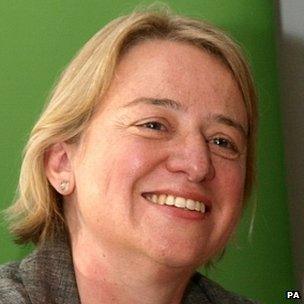Ambitious Greens look for electoral take-off
- Published

Natalie Bennett is promising to take her party into places where few Greens have gone before
In the basement of an office block in east London, a couple of dozen chairs are assembled in front of a desk.
No security guards here, sporting their trademark earpieces and severe facial expressions. Little prospect of a media scrum.
No spin doctors either, cajoling, persuading, or, dare I say it, haranguing.
Welcome to the headquarters of the Green Party of England and Wales.
And welcome to a leadership election in a party for which such events are a novelty.
The party used to have "principal speakers", rather than a single leader. As recently as the early 1990s, it had six of them at the same time.
'Large opportunities'
In 2008, after a referendum of the party membership, that system was scrapped and Caroline Lucas was elected as the first solo leader.
She stood aside recently, arguing the profile of being leader helped her become the party's first MP two years ago, and someone else should now benefit from that exposure.
Step forward Natalie Bennett. Emerging out of the thicket of percentages and reallocated ballots associated with the Single Transferable Vote, the former Guardian journalist from Camden in North London, via Australia, addressed the media.
The banners behind her were green, but the messages less so.
"We will make housing affordable." "We will reduce the gap between rich and poor." "We will cut fares and reduce traffic."
A nod to the idea that people might care a bit less about climate change when the economy is in poor health? The two issues are not mutually exclusive, Miss Bennett insisted.
Her pitch for the top job was to raise significantly the Green Party's electoral ambitions. Her priority would be ensuring Green candidates can win seats across England and Wales on councils, in the European Parliament and at Westminster. The current tally of one MP, two MEPs and 134 councillors represented, she suggested, merely the electoral foothills for the party.
Deputy Duckworth
"Britain, Europe and the world are experiencing troubled economic, environmental and political times. In Greece, a radical party, Syriza, has gone in less than a decade from being a tiny political voice to being the second biggest party in parliament. We can expect large changes in the political landscape, large political opportunities, in the coming years," she wrote in her manifesto.
It seems it is only in politics than people talk about the first 100 days in a job. The big parties at Westminster all do it. It turns out the new Green leader does too. She has already signed herself up to a tour of what amounts to the party's heartlands, its biggest council groups. So Brighton, Norwich, Lancaster, Oxford and Solihull will feature as stop-offs, as will Redhill in Surrey and Dudley in the West Midlands.
Members there learn about how local parties have "made strong progress in non-traditional areas" for the Greens.
As Natalie Bennett did a round of television, radio and newspaper interviews, in an adjoining room ballot papers were still being counted. It was not just a leader being elected today, but a deputy too. But that race had a twist.
The party is committed to having a man and a woman in its two biggest jobs. So with a woman elected leader, her deputy had to be a man. Step forward Councillor Will Duckworth from Dudley. And cue the opening of a few celebratory bottles to toast the completion of this internal democratic process. Prosecco and apple juice were the tipples of choice.
The challenges for Miss Bennett start now. Battling for attention is the key one.
Her first big task will be to write her leader's speech for the party conference. This is daunting for any party, but even more so on day five in the job. The Greens are gathering in Bristol on Friday.
- Published13 May 2012
- Published3 September 2012
- Published3 September 2012
- Published3 September 2012